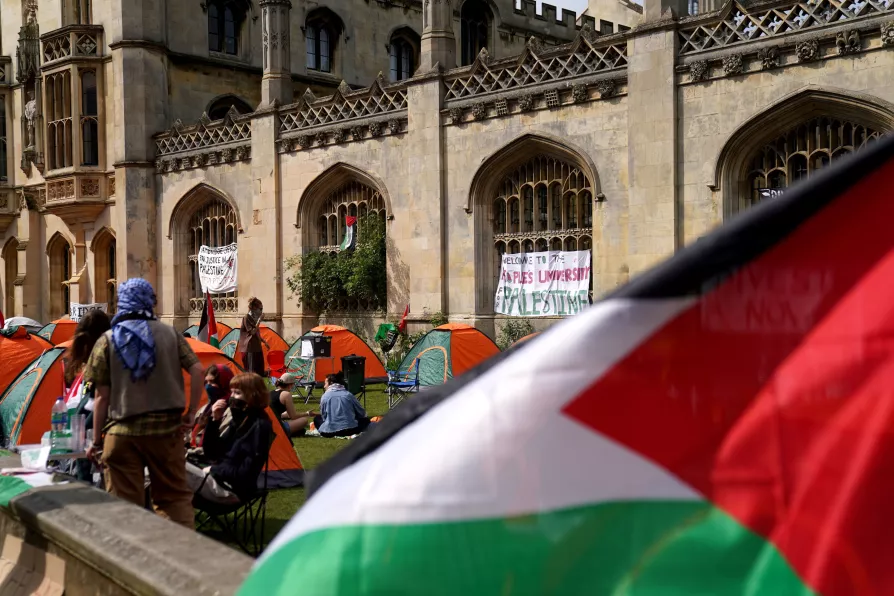
 Students at an encampment on the grounds of Cambridge University, protesting against the war in Gaza, May 7, 2024
Students at an encampment on the grounds of Cambridge University, protesting against the war in Gaza, May 7, 2024
RISHI SUNAK is not summoning university vice-chancellors to Downing Street because he is worried, as he claims to be, by the safety of Jewish students.
His authoritarian stunt is aimed at peaceful encampments in solidarity with Palestine — which are springing up in city after city as Israel begins a savage assault on Gaza’s last refuge, Rafah.
Governments are alarmed by the scale of anger over their complicity in Israel’s war crimes. They have been forced to shift position by it — without the huge peace marches, Britain would never have voted for a ceasefire at the UN.
But they are furious. Ministers — and many MPs — resent the intrusion of people power into their elite world. Even as they make concessions, they are looking at how to defeat the streets.
This is all the more dangerous because of the context. The British state’s systematic erosion of our rights predates the Israeli invasion of Gaza. And it enjoys the effective support of the Labour opposition.
The Tories continue to implode, but the process only highlights the similarity between the big parties. Natalie Elphicke, the Dover MP who defected to Labour today, is no centrist “one-nation Conservative,” lamenting the party’s capture by the xenophobic right. She has backed Tory governments to the hilt as they rip up refugees’ rights: most recently voting with the government to reject every single Lords amendment to the Rwanda deportations scheme.
A spokesman for Keir Starmer can nonetheless say that she “shares our values.” The Elphicke desertion even provided him with a platform to depict the Conservatives as soft on immigration, with the human rights lawyer turned Labour leader railing in the Commons at a “Tory amnesty” for immigrants — even as the police round up asylum-seekers for the first flights to Rwanda, and buses continue to take them for offshore imprisonment on the Bibby Stockholm barge where one committed suicide in December.
So Sunak is being egged onto ever harsher attacks on refugees not just by his own backbenchers, but by Labour. And this mutual reinforcement applies to attacks on British citizens’ rights as well.
Robert Jenrick twins immigration with “extremism” as fields for new crackdowns that will somehow save the Tory brand. The peaceful Palestine protests, whether marches or camps, are in his sights: but there is nothing new here.
Michael Gove’s extremism definition already sets a precedent in allowing ministers to blacklist organisations which object, on any fundamental level, to our political system. The police are already arresting people for carrying banners and placards deemed politically suspect. The attack on free speech at universities, primarily aimed at the boycott, divestment & sanctions (BDS) movement, rolls on. And in all these fields Labour is often found urging the government to go further and faster.
Deepening authoritarianism is a cross-party, ruling-class policy. It is an answer to collapsing public trust in a system which will not maintain public services at the standard we used to expect, which makes people poorer year on year and which has no answers to the global dilemmas of the day, from war to climate change.
We know Labour will not invest in public services, raise wages, prioritise peace or meet the climate challenge because it keeps telling us so. Its support for eroding our democratic rights makes sense: in power it, too, will need to suppress the grievances it cannot address.
Opposition to the British state’s human rights abuses does not come from parliamentary front benches, but from the direct actions of citizens like the 45 arrested earlier this month in Peckham for obstructing a coach headed for the Bibby Stockholm.
The same is true when it comes to British state support for war crimes abroad, like those being committed now in Gaza. Solidarity with the protest camps: their suppression would be another step on the road to silencing us all.














